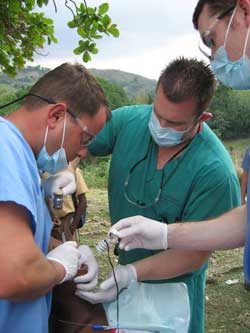Smiles for Miles: Dental students return from annual trip to Haiti
 Josh Bresler
Josh Bresler (left), associate professor of pediatrics, and students Ryan Calvi (middle) and Trevor Griffitts (right) remove a broken root tip with a mallet and chisel.
After the 7.0 magnitude earthquake hit Haiti earlier this year, students at the Kornberg School of Dentistry weren’t sure they would be able to have their annual trip to the small town of Jeremie, to provide much needed oral care to a group of people who sometimes walk several miles for treatment. For the past 15 years, Kornberg students and faculty members have spent their spring breaks in Haiti to give care in conditions that were less than ideal — no food, no running water and no modern equipment. But in the wake of the earthquake, things were even worse. “Without the benefit of proper lighting, suction and x-rays, which we take for granted at home, we are back to the basics of primitive oral surgery,” said Josh Bresler, an assistant professor of pediatric dentistry, and the group’s faculty liaison. “When a tooth breaks, we often have to use a chisel and mallet to split the roots or remove bone.” While their fate was uncertain at first, the students still tried to help out in any way they could — collecting money, canned goods, clothing and other donations, and even selling Temple dental school merchandise. Once their plans were finalized, the group — known as the Temple Haiti Club — mobilized quickly, and on March 7, they were on a plane to Port-au-Prince. After arriving in the Haitian capital, the group set out for Jeremie and surrounding villages. Eleven students and four faculty members provided care to more than 1,000 patients over the course of a week. Bresler said that he and the students were excited to help so many people. One patient in particular, an 88-year old woman, had a very difficult tooth extraction. One of the translators said she felt so bad that her doctor was struggling with her tooth, she wanted to leave. “When we finally got the root tips out she waved her hands in the air and began to sing and gave us all hugs — things you don’t often experience in the states,” he said. The club also had the opportunity to visit one of the local hospitals and found a stark contrast to conditions in the U.S. “We were able to see the operating room, although we had to walk through a hallway full of rubble to get there, and the primitive maternity and birthing suites. Each patient room had over 10 people — many were trauma victims from the earthquake,” said Bresler. While the students saw and treated a number of patients who needed standard oral care — mostly extractions — there were a few patients who had suffered trauma as a result of the earthquake. One man had his jaw broken after a brick fell from a building and hit him in the face. The student doctors were able to fix and remove some of the teeth that were fractured during the accident and also provide him with medication for the pain while his jaw healed. In addition to a lack of modern technology to treat patients, the group had a number of other factors to contend with: heat, bugs and even the hilly terrain. Bresler said at one of their sites, in the town of Marfranc, their chairs had been set up on the side of a cliff — with rocks and boulders used to secure the legs. On the last day of the trip, the team’s flight home was cancelled due to powerful storms in Philadelphia. But it gave them the opportunity to tour Port-au-Prince for the first time since the earthquake. Bresler said what he saw there could not easily be put into words. “I remember some beautiful buildings from previous trips that are now only piles of concrete and trash,” he said. “The court house, presidential palace, major churches and schools were all demolished. The smell throughout the city was horrible from trash and what must have been bodies decaying under the still huge piles of rubble everywhere.” Yet despite all of that, the students and faculty members were eager to help, and are even more eager to return next year. “The things we saw on this trip will change our lives forever,” said Bresler. “It’s hard work, but very rewarding.” |